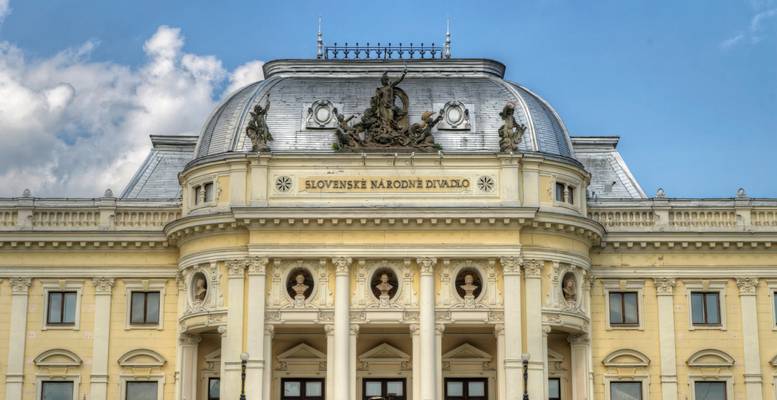
Slovakia »
Bratislava
Bratislava, the capital city of Slovakia, is a hidden gem in Central Europe that offers a unique blend of history, culture, and natural beauty. The city is situated on the banks of the Danube River and is surrounded by the picturesque Little Carpathian Mountains. Bratislava is a perfect destination for photography enthusiasts, as it boasts a plethora of stunning locations that are perfect for capturing the city's charm. From the historic Old Town with its cobbled streets and colorful buildings to the majestic Bratislava Castle, there are plenty of opportunities to capture the city's beauty. Other popular photography locations include the UFO Observation Deck, the Blue Church, and the Devin Castle.

by jim stephenw
Located by the Hviezdoslav Square, the Neo-Renaissance building was built in 1885–1886 during the time of Austria-Hungary, based on a design by the Viennese architects Fellner & Helmer, who designed theatre buildings in 10 European countries. It was opened as the City Theatre on September 22, 1886 with the opera Bánk Bán of Ferenc Erkel, which is one of the most important Hungarian operas. As a sign of this event's importance, Kálmán Tisza Hungarian the Prime Minister and his whole government took part in this ceremony. The gala performance was conducted by Ferenc Erkel himself. The original building was designed for 1000 spectators and was illuminated using 800 gas lamps, while the auditorium had a lustre with 64 lights. The interior was decorated with frescos by Pressburg/Pozsony native painter Kornél Spányik and by paintings by Munich artist Leo Lüttgendorf-Leinburg, among others. The City Theatre was hired by German and Hungarian professional theatre companies, but beginning in 1919 (at the creation of Czechoslovakia), it was used by Czech and later also Slovak ensembles. In 1920 it became the Slovak National Theatre.
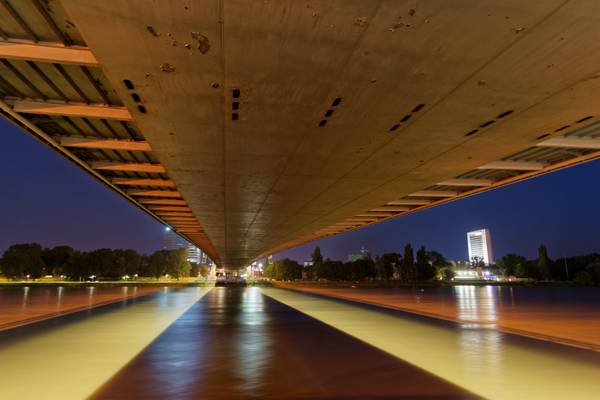
by jim stephenw
Most SNP ("Bridge of the Slovak National Uprising"), commonly referred to as Most Slovenského Národného Povstania or the UFO Bridge, and named Nový Most ("New Bridge") from 1993 to 2012, is a road bridge over the Danube in Bratislava, the capital of Slovakia. It is the world's longest bridge to have one pylon and one cable-stayed plane. Nový Most is an asymmetrical cable-stayed bridge with a main span length of 303m, a total length of 430.8m, a width of 21m and a weight of 537 t. There are four lanes for motor traffic on the upper level and lanes for bicycles and pedestrians on the lower level.
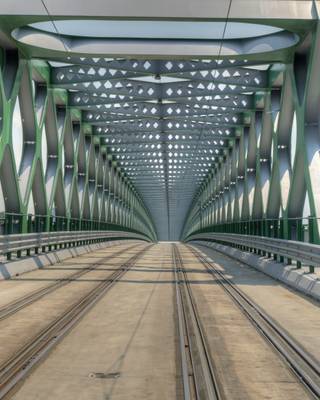
by jim stephenw
Starý Most (English: Old Bridge) is a bridge over the river Danube in Bratislava, Slovakia. The 460-meter-long (1,510 ft) bridge included a wooden pathway for pedestrians, a two-lane road and railway track, connecting the historic old city of Bratislava with the newer region Petržalka. The bridge was closed for cars in 2009 and for buses on 14 May 2010. On 2 December 2013 it was also closed for pedestrian and bicycle traffic because deconstruction of the bridge began the last week of November. At the time of its closure it was the oldest still-standing bridge in Bratislava. As of December 2015, the bridge was replaced by a new one for pedestrians, cyclists and trams, as part of new tram track to Petržalka.
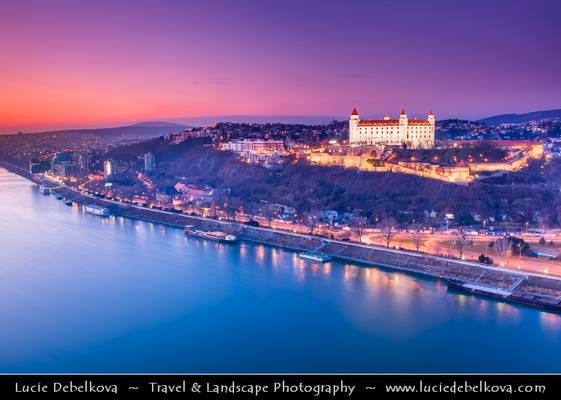
**Join me @ Facebook | Twitter | 500px | Instagram | YouTube **
Bratislava (German: Pressburg (Preßburg), Hungarian:...
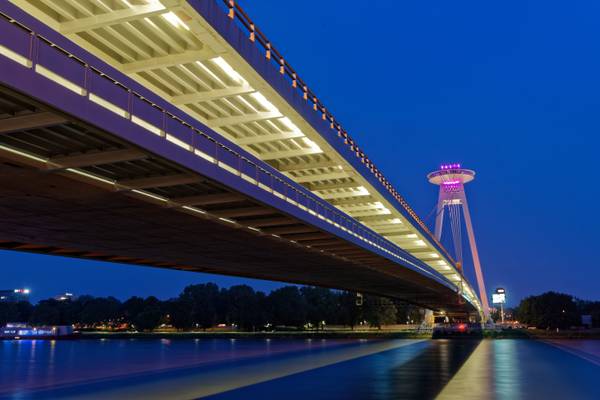
by jim stephenw
Most SNP ("Bridge of the Slovak National Uprising"), commonly referred to as Most Slovenského Národného Povstania or the UFO Bridge, and named Nový Most ("New Bridge") from 1993 to 2012, is a road bridge over the Danube in Bratislava, the capital of Slovakia. It is the world's longest bridge to have one pylon and one cable-stayed plane. Nový Most is an asymmetrical cable-stayed bridge with a main span length of 303m, a total length of 430.8m, a width of 21m and a weight of 537 t. There are four lanes for motor traffic on the upper level and lanes for bicycles and pedestrians on the lower level.
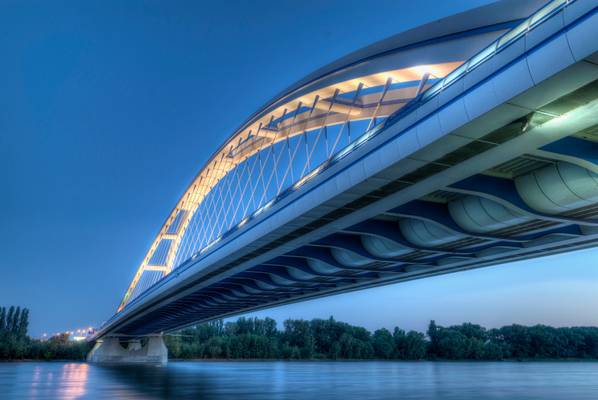
by jim stephenw
Apollo Bridge (Slovak: Most Apollo, provisionally known as Most Košická during construction, after the street leading to it) in Bratislava is a road bridge over the Danube in the capital of Slovakia. It is located between the Starý Most and Prístavný Most Bridges, a site which allowed almost perpendicular bridging, resulting in the shortest possible span. Construction of the bridge began in 2003 and it was opened to the public on September 5, 2005. It is named for the "Apollo" oil refinery which was situated on the left river bank in this area before World War II. Its curved lines, inclined arches and virtual absence of right angles make the geometric shape of the bridge very sophisticated. In an unprecedented manoeuvre, the 5,240-ton steel structure, spanning 231 metres, was rotated across the river from its construction site on the left bank into its final position on a pillar 40 metres from the right bank. The Apollo Bridge was the only European project named one of five finalists for the 2006 Outstanding Civil Engineering Achievement Award (OPAL Award) by the American Society of Civil Engineers.
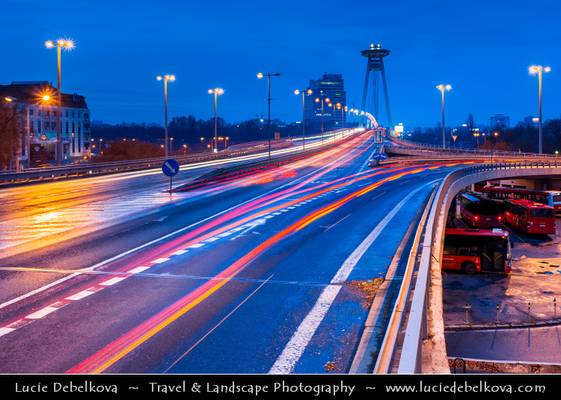
** Join me on Facebook | Google+ | Twitter | 500px | Instagram **
It is the 32nd-tallest, and thus shortest, member of the...
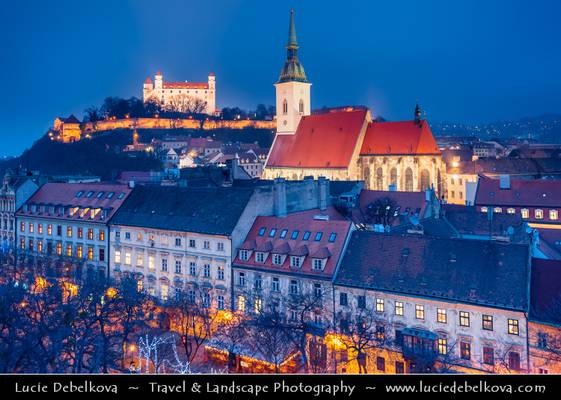
** Join me on Facebook | Google+ | Twitter | 500px | Instagram **
Bratislava (Pressburg - Pozsony) is the capital of Slovakia...
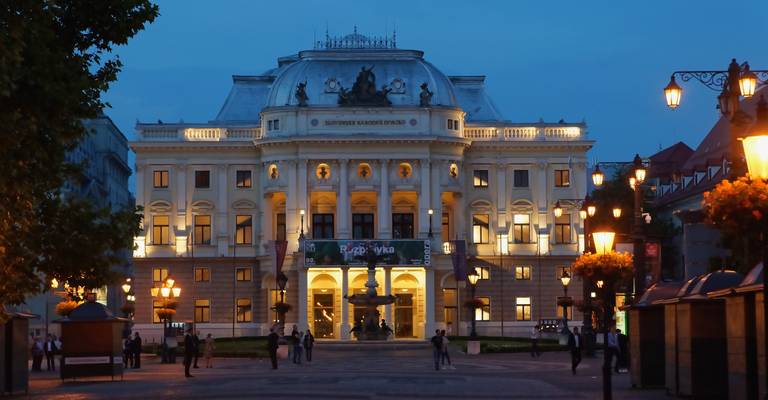
by jim stephenw
Located by the Hviezdoslav Square, the Neo-Renaissance building was built in 1885–1886 during the time of Austria-Hungary, based on a design by the Viennese architects Fellner & Helmer, who designed theatre buildings in 10 European countries. It was opened as the City Theatre on September 22, 1886 with the opera Bánk Bán of Ferenc Erkel, which is one of the most important Hungarian operas. As a sign of this event's importance, Kálmán Tisza Hungarian the Prime Minister and his whole government took part in this ceremony. The gala performance was conducted by Ferenc Erkel himself. The original building was designed for 1000 spectators and was illuminated using 800 gas lamps, while the auditorium had a lustre with 64 lights. The interior was decorated with frescos by Pressburg/Pozsony native painter Kornél Spányik and by paintings by Munich artist Leo Lüttgendorf-Leinburg, among others. The City Theatre was hired by German and Hungarian professional theatre companies, but beginning in 1919 (at the creation of Czechoslovakia), it was used by Czech and later also Slovak ensembles. In 1920 it became the Slovak National Theatre.
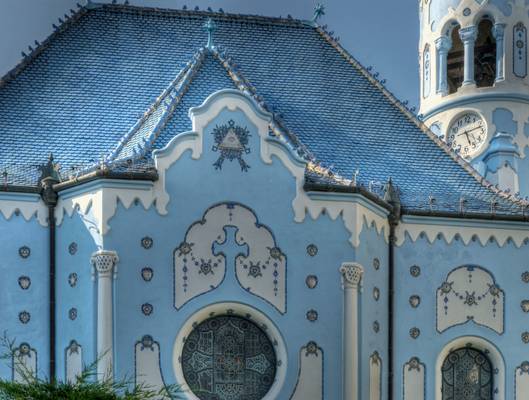
by jim stephenw
The Church of Saint Elizabeth, commonly known as Blue Church is a Hungarian Secessionist Catholic church located in the eastern part of the Old Town in Bratislava, present day Slovakia. It is consecrated to Elisabeth of Hungary, daughter of Andrew II, who grew up in the Pressburg Castle. It is referred to as "The Little Blue Church" because of the colour of its façade, mosaics and blue-glazed roof.
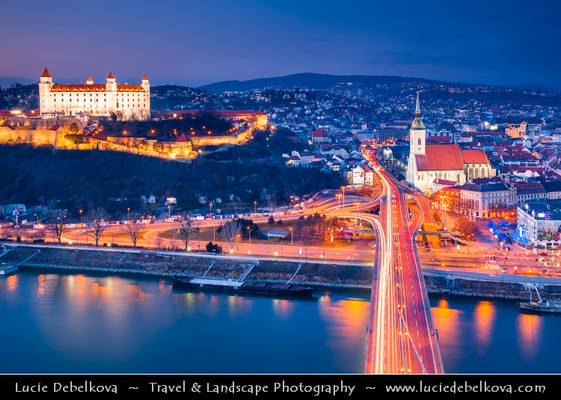
** Join me on Facebook | Google+ | Twitter | 500px | Instagram **
Bratislava (Pressburg - Pozsony) is the capital of Slovakia...
Thanks to all Phoide contributors to Bratislava!
Most notably jim stephenw.